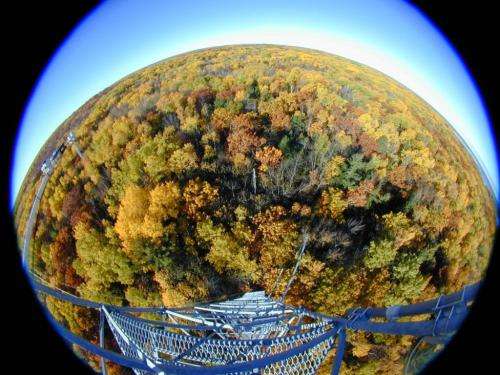Natural response to slow global warming increases forest carbon uptake

(Phys.org) —A two-decade study of carbon storage changes within North American forests provides new evidence of the direct impact of climate change on ecosystem function, opening questions for how Australian ecosystems are responding.
Researcher Dr Trevor Keenan led the study across temperate forests of North America, where a strong trend of seasonal changes indicates an ecological adaption to extend the 'green' seasons, thus enhancing ecosystem carbon uptake.
The study shows increased carbon uptake, for both an earlier spring and later autumn. This constitutes a positive response to climate change, and is serving to slow the rate of warming.
"In contrast to previous suggestions, this study shows that carbon uptake through photosynthesis increased considerably more than carbon release through respiration. We observed a strong trend for both an earlier spring and later autumn," said Dr Keenan.
Researchers assessed changes of temperate forests, combining long-term ground observations of the timing of spring and autumn, satellite observations, and ecosystem-scale carbon dioxide flux measurements, along with 18 terrestrial biosphere models.
"The timing of plant life cycle (phenological) events exerts a strong control over ecosystem function, and leads to multiple feedbacks to the climate system.
"The terrestrial biosphere models tested misrepresent the temperature sensitivity of phenology, and thus the effect on carbon uptake. Our analysis of the temperature-phenology-carbon coupling suggests a current and possible future enhancement of forest carbon uptake due to changes in phenology."
This study means researchers could directly observe the effect climate change is having on ecosystem function in North America. To date, little still is known about how Australian ecosystems have responded to global warming, but Keenan and Macquarie's world-leading environmental sciences research team will continue to examine these questions.
More information: "Net carbon uptake has increased through warming-induced changes in temperate forest phenology," Nature Climate Change, 2014, Trevor F. Keenan, Josh Gray, Mark A. Friedl, Michael Toomey, Gil Bohrer, David Y. Hollinger, J. William Munger, John O'Keefe, Hans Peter Schmid, Ian Sue Wing, Bai Yang, Andrew D. Richardson.
Journal information: Nature Climate Change
Provided by Macquarie University

















